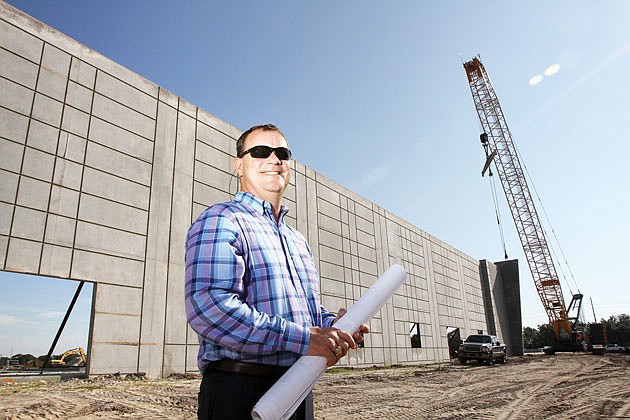- November 24, 2024
-
-
Loading

Loading

Richard LeFrois spent the early 2000s scouting around for a place to expand his family's Rochester, N.Y.-based commercial contracting and development company, which had built more than 3 million square feet since its inception in 1963.
He checked out Virginia and poked around South Carolina before a chance meeting with a Southern Wine & Spirits executive in New York changed his trajectory.
“He says to me, 'Have you ever heard of Lakeland?' Well, I hadn't,” says LeFrois. “I flew down the next weekend and things just felt right, like it was the right environment to expand the business.”
In 2004, LeFrois bought roughly 400 acres in the Interstate 4 corridor, almost smack in the middle of Tampa and Orlando in Plant City and Lakeland, and Central Florida Development was born.
Its first Florida project, a pair of 150,000-square-foot industrial buildings, became the foundation for the Eagles Landing Business Park, in 2006. When prescription benefit manager WellDyne Rx committed to taking down roughly half the space, LeFrois knew he was on to something.
What he couldn't have known was how profoundly the last decade's economic recession would impact real estate development of all kinds in Florida.
Central Florida didn't put a shovel in dirt again until 2014, when water and coffee distributor DS Services, a division of Cott Corp., approached Central Florida about doing a 75,000-square-foot build-to-suit project.
The following year, Central Florida took a gamble on a waxing market and built a 100,000-square-foot industrial property in Plant City without tenants in place -- the first speculative development in the Hillsborough County city in two decades.
Leasing began at the County Line Commerce Center project in September 2015. By year-end, the project was fully committed.
“We sensed a demand in the market and went ahead,” says Jeff Lucas, a Central Florida executive.
Central Florida's timing coincided with a renewed emphasis by logistics and distribution companies on the I-4 corridor. Fueled by Amazon, Wal-Mart, Southern Wine & Spirits, Publix Super Markets and others who recognized the corridor allowed them to reach more than 8 million people in a day's drive, distributors have flocked to the area.
Last year, boosted by growing demand, Central Florida pushed ahead using the same playbook: It constructed another 100,000-square-foot building, spec, in the same park — and with the same results.
Tenants Sparkleskirts, a running apparel company, and Dart Container Corp. snapped up all of the space available.
“They've been outstanding with us,” Tom Powell, who helped found SparkleSkirts with his wife, Leah, in 2008, says of Central Florida. “They built our space exactly as we wanted it, and I've never had a complaint. We started off in 15,000 square feet with them, and now we're in 30,000 square feet, and still growing. I expect we're going to grow with them.”
Lucas says what differentiates Central Florida from the competition is its ability to construct, develop, lease and manage its properties in-house.
“Our big advantage is we're a single point of contact for the customer,” says Lucas, who joined Central Florida three years ago after working at the Tampa Hillsborough Economic Development Corp.
“We do a lot of our own construction, we work on all facets of the development process, we handle most of our leasing and we manage our properties ourselves.”
But he contends what separates Central Florida from a handful of other firms with development pedigree building major spec industrial projects in the I-4 Corridor — Duke Realty, McCraney Property Co., Brennan Investment Group and Flagler Development among them — is the company's approach to ownership.
“What makes us different is we're a long-term owner,” Lucas says. “We're not building then selling. And we're very hands on with our tenants. Quality construction, in both the materials we use and the way we build, is very important to us.”
Central Florida's attention to detail also received notice from the Tampa-area chapter of the National Association of Industrial and Office Parks, which named the company its “Developer of the Year” in both 2015 and 2016.
That same attention to detail — and amount of risk — can be found at the company's latest venture, a speculative 137,500-square-foot building in its Central Florida Commerce Park, a 72-acre site in Plant City.
There, Central Florida is building to meet the needs of modern distributors: 30-foot clear ceiling heights, a 195-foot truck court and ample parking for trucks and cars alike.
Construction began in May, and is scheduled to be completed next month. To date, Central Florida has not signed any leases for the building.
“We've had a lot of good activity and we feel good about the market and the location of the project,” Lucas says. “Companies want to maximize their space these days, so that influenced the dimensions of what we're building there.”
At build out, the business park is slated to contain 900,000 square feet in as many as seven buildings.
Looking ahead, Lucas says the company intends to develop along the Interstate 4 corridor for years to come, while maintaining the roughly 700,000 square feet its developed to date — space that is nearly 100% occupied.
“We still have about 200 acres of land that can accommodate up to 3 million square feet,” he says.
At County Line Commerce Center, there remains a trio of sites available for roughly 65,000 square feet of offices or restaurants. At Eagles Landing, eight acres suitable for a hotel and restaurants are on the market.
In Lakeland, the company's planned Airpark Commerce Center, near the Lakeland Airport, can hold up to 1 million square feet.
LeFrois says, however, that no matter how much space Central Florida builds, one tenet will always govern the company.
“We treat our tenants like our customers, because we know that their leases will renew at some point,” LeFrois says.